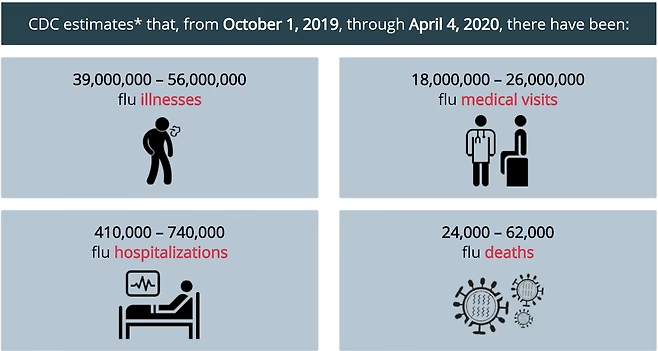
Should I get a flu shot in 2020?
In an ordinary year, the flu shot is important, especially for healthcare workers, teachers, pregnant women, and people over the age of 65. It’s always encouraged for others and provides many benefits to those who get the vaccine.
But as we all know, 2020 isn’t a normal year.
And in 2020, getting your flu shot is more important than ever.
The Typical Impact of Seasonal Flu
In Alabama, flu season occurs every year in the fall and winter. The peak months for the flu are December and January, but cases usually begin to rise in November and can last until May. Anyone can get the flu, even if they’ve had it in years past.
Most people who get the flu will experience mild to moderate symptoms such as fever and chills, body aches, cough, congestion, and fatigue. These symptoms usually last a week or two. But influenza is always a significant medical threat, especially to older individuals and those who may have underlying health issues such as asthma, diabetes, and heart disease.
While influenza can be more active in some years, it is always present. For the 2019-2020 flu season in the United States, the CDC estimates that there were between 40 million and 56 million cases of the flu. As many as 62,000 people died as a result of complications from the flu.1

Typical Benefits of the Flu Shot
The flu shot is available every year to help people fight the flu. While the flu shot isn’t 100% effective and protecting people from the flu, it does have many important benefits.
- The flu shot primes your immune system to fight the flu.
The flu shot does not give you the flu. Instead, it teaches your immune system to recognize that the flu virus is a threat. Your immune system then prepares to fight the flu by creating antibodies that are already ready to fight infection as soon as it recognizes the virus. - The flu shot reduces your risk of getting the flu.
According to the CDC,2 the flu vaccine prevented about 4.4 million influenza illnesses and 2.3 million flu-associated medical visits. When the flu shot is a good match for the flu viruses that are circulating that year, the vaccine reduces flu-related doctor’s visits by 40-60%. - The flu shot reduces the risk of severe complications or poor outcomes if you do get the flu.
Patients who get the flu shot are much less likely to be admitted to the ICU for flu-related complications. And for those who are admitted to the hospital, people who have been vaccinated spend, on average, 4 fewer days in the hospital than those who have not been vaccinated.3 - The flu shot keeps you from giving the flu to others.
If you’re already immune to the flu and don’t get sick because of the flu shot, you can’t transmit it to anyone else. And if you do get the flu after getting the flu shot, you usually have milder symptoms that don’t last as long. As a result, you’re infectious for a shorter period of time.

The 2020 Flu Season
We already know that the 2020 flu season will be unlike any other flu season. Because COVID-19 will still be spreading during flu season, there will be two very similar, flu-like illnesses circulating at the same time.
Double trouble
Although influenza and COVID-19 are similar, it is possible to be infected with both viruses at the same time. Both flu and COVID-19 are highly contagious respiratory viruses that can result in serious illness. Flu and COVID-19 can also have serious consequences for older, more vulnerable individuals. COVID-19 has been particularly dangerous for this population.
Get tested
When a patient gets sick with either flu or COVID-19 during flu season, it can be difficult to differentiate between the two without a test. The symptoms for both flu and COVID-19 are consistent with an influenza-like upper respiratory illness. There are tests coming for the upcoming flu season that will test for both viruses.
While many people who have the flu usually stay home, rest, hydrate, and take fever-reducing medicines, it will be important for patients with a flu-like illness to get tested to rule out COVID-19. COVID-19 is contagious for longer and poses a greater risk for acute respiratory distress syndrome.4
Other risks
You can also increase your risk of contracting one virus while you’re in the recovery period of the other.

Unique Benefits of the Flu Shot in 2020
While we’ve already discussed the benefits of the flu shot in a regular year, there are also several specific benefits to getting the flu shot in 2020.
- The flu shot may make it less likely that you’ll contract COVID-19.5
While influenza and COVID-19 are caused by two different viruses with different antibodies, early research indicates that the flu shot can change how your body responds to several types of viruses, not just the flu. - The flu shot may make it less likely that you’ll have severe complications from COVID-19.6
A study of confirmed COVID-19 patients in Brazil indicates that patients who had the flu shot were about a third less likely to die from COVID-19 than those who did not have the flu shot. They were also 8% less likely to need intensive care and 20% less likely to need respiratory support. - Getting the flu shot will decrease confusion for diagnosis and treatment.
If you do get sick with a serious upper respiratory infection during flu season, it will be easier to assume it is COVID-19 since you have already been vaccinated against the flu. This makes testing, treatment, and mitigation more straightforward. - The flu shot can strengthen your immune response to other viral illnesses.
If you do get sick with the flu, your immune system is temporarily weakened and you are susceptible to other illnesses.5 But the flu shot actually primes your immune system to fight off other viruses, helping you to stay healthy during flu season.
Types of Flu Shots
Flu shots are available each year, starting in September. There are several types of flu shots, and your doctor can help you determine which vaccine is best for you.
- Most flu vaccines are known as quadrivalent flu shots. These vaccines protect against four different flu viruses, including Flu A H1N1, Flu A H3N2, and two Flu B viruses.
- Other flu vaccines are known as trivalent flu shots. These vaccines protect against three different flu viruses, including both Flu A viruses and one Flu B virus.
- The “High Dose” Flu shot is a type of trivalent vaccine that is designed for people 65 and older. This flu shot creates a stronger immune response in this more vulnerable population.
How to Get a Flu Shot
The best time to get a flu shot is in late September and early October so that your body has plenty of time to develop an immune response before flu season escalates. This year, you should get the flu shot as soon as possible. But it’s really never too late to get the flu shot since the flu season can extend all the way to May.
Flu shots are now available at all five MedHelp clinics. No appointment is needed for a flu shot. Simply walk in and let us know you’d like to get vaccinated.
Do what it takes to stay healthy
When we’re laser-focused on specific health issues, it can be easy to forget to do the regular, everyday things that help us maintain our health. Although we’re all focused on the COVID-19 pandemic, the presence of COVID-19 does not eliminate or change the risk for other illnesses such as the flu. Protect your overall health by staying up-to-date on all of your vaccines, including the 2020-2021 flu vaccine.
Flu shots are available now at each of our five Birmingham-area locations. No appointment needed.
References:
12019-2020 U.S. Flu Season: Preliminary Burden Estimates. (2020, April 17). Retrieved September 23, 2020, from https://www.cdc.gov/flu/about/burden/preliminary-in-season-estimates.htm
2What are the benefits of flu vaccination? (2020, August 31). Retrieved September 23, 2020, from https://www.cdc.gov/flu/prevent/vaccine-benefits.htm
3Ibid.
4Zanettini, C.; Omar, M.; Dinalankara, W.; Imada, E.L.; Colantuoni, E.; Parmigiani, G.; Marchionni, L. Influenza Vaccination and COVID19 Mortality in the USA. MedRxiv 2020.
5Fink, G.; Orlova-Fink, N.; Schindler, T.; Grisi, S.; Ferrer, A.P.; Daubenberger, C.; Brentani, A. Inactivated trivalent influenza vaccine is associated with lower mortality among Covid-19 patients in Brazil. MedRxiv 2020.
6Mei, J. (2010, October 02). Influenza Renders Immune System Vulnerable. Retrieved September 23, 2020, from https://www.yalescientific.org/2010/10/influenza-renders-immune-system-vulnerable